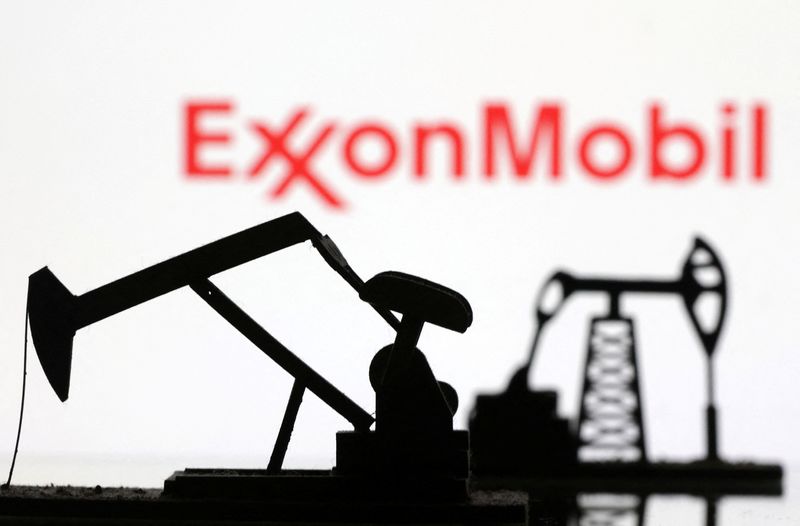By Tim McLaughlin
(Reuters) -Exxon Mobil’s income tax payments to the U.S. government have dropped to 3% over the past five years – several times below the company’s 20-year average – on massive deductions passed under former President Donald Trump.
Corporate tax experts say Exxon (NYSE:XOM) could enjoy low taxes for several more years, at a time when the government needs more money to fund an ambitious fight against climate change. President Joe Biden’s minimum corporate tax is off to a shaky start and calculation of the 15% tax factors in the Trump accelerated depreciation deductions that Exxon used last year.
That lowered its tax rate to a rock-bottom 2.5% on domestic profit of $28.3 billion, according to the "current federal income tax expense" Exxon disclosed in its annual report.
“If you view the use of these tax breaks as a problem, Biden’s new minimum tax is unlikely to end that,” said Matt Gardner, a senior fellow at the nonpartisan Institute on Taxation of Economic Policy (ITEP) in Washington D.C.
In sharp contrast, the most valuable companies representing major sectors of the U.S. economy paid an average tax rate on domestic profits at least seven times higher than Exxon, according to a Reuters analysis of the companies' latest annual financial reports. The group includes Apple (NASDAQ:AAPL), Meta Platforms (NASDAQ:META), JPMorgan Chase (NYSE:JPM), Sherwin-Williams (NYSE:SHW) and Union Pacific (NYSE:UNP).
Exxon’s recent tax advantage reveals how the U.S. tax code hinders the Biden administration’s push to be a world leader in limiting fossil fuels. The corporate minimum tax is the main source of revenue for the president’s green energy agenda in the 2022 Inflation Reduction Act.
The Internal Revenue Service (IRS), however, has delayed a roll out of the tax, which has been roiled by complexity and confusion, said Will McBride, vice president of tax policy at the Tax Foundation, a pro-business think tank.
“There is nothing in the (corporate minimum tax) to guarantee a 15% minimum rate,” McBride said.
The White House declined to comment for this story, but a spokesperson pointed to Biden's public commitment to end "tens of billions of dollars of federal tax subsidies for oil and gas companies."
Since 2003, Exxon’s current federal income tax expense – a proxy experts use to divine what companies pay on U.S. tax returns – averaged 17% for the 16 years the company generated a pre-tax profit from domestic operations, according to Exxon financial disclosures.
But since Trump’s Tax Cuts and Jobs Act became law in 2017, Exxon’s rate has plummeted to less than 3% in the three years when the company’s domestic operations showed a profit, the disclosures show.
Last year, for example, Exxon’s tax rate was 2.5%, or $696 million, on record pre-tax U.S. profit of $28.3 billion. Exxon would have paid nearly $6 billion at the federal statutory tax rate of 21%.
Exxon said, however, its U.S. income tax liability for 2022 was "several billion dollars" and the highest amount paid in more than 10 years. The company declined to elaborate why that amount was so much higher than the current federal income tax expense figure it provided to investors.
Before this year, Trump’s accelerated depreciation allowed companies to immediately deduct 100% of the billions of dollars many spend each year on property and equipment, up from 50% previously. The incentives, phased down to 80% this year, extend to all sectors of the economy, but they are amplified in the fossil fuel sector due to the capital-intensive nature of extracting oil and gas.
Exxon capitalized on the deductions in 2022, for example, after spending $9.5 billion on U.S.-based capital and exploration projects, including in the Permian Basin oil and gas field and on a Beaumont, Texas refinery expansion, company financial disclosures show.
“Sure enough, industry lobbyists are now back trying to get Congress to extend the tax break,” U.S. Senator Sheldon Whitehouse, a Rhode Island Democrat, told Reuters.
Russ Hamilton, an accounting professor at Southern Methodist University’s Cox School of Business, said that under normal circumstances the cumulative tax benefit from accelerated depreciation is meant to zero out over time as annual capital investments slow.

But if companies continue to spend money on large capital projects – like finding and developing new oil fields - payments on deferred income taxes can be postponed for years.
“These deferred income tax liabilities can go on forever," said Donald Williamson, an accounting professor at American University’s Kogod School of Business.